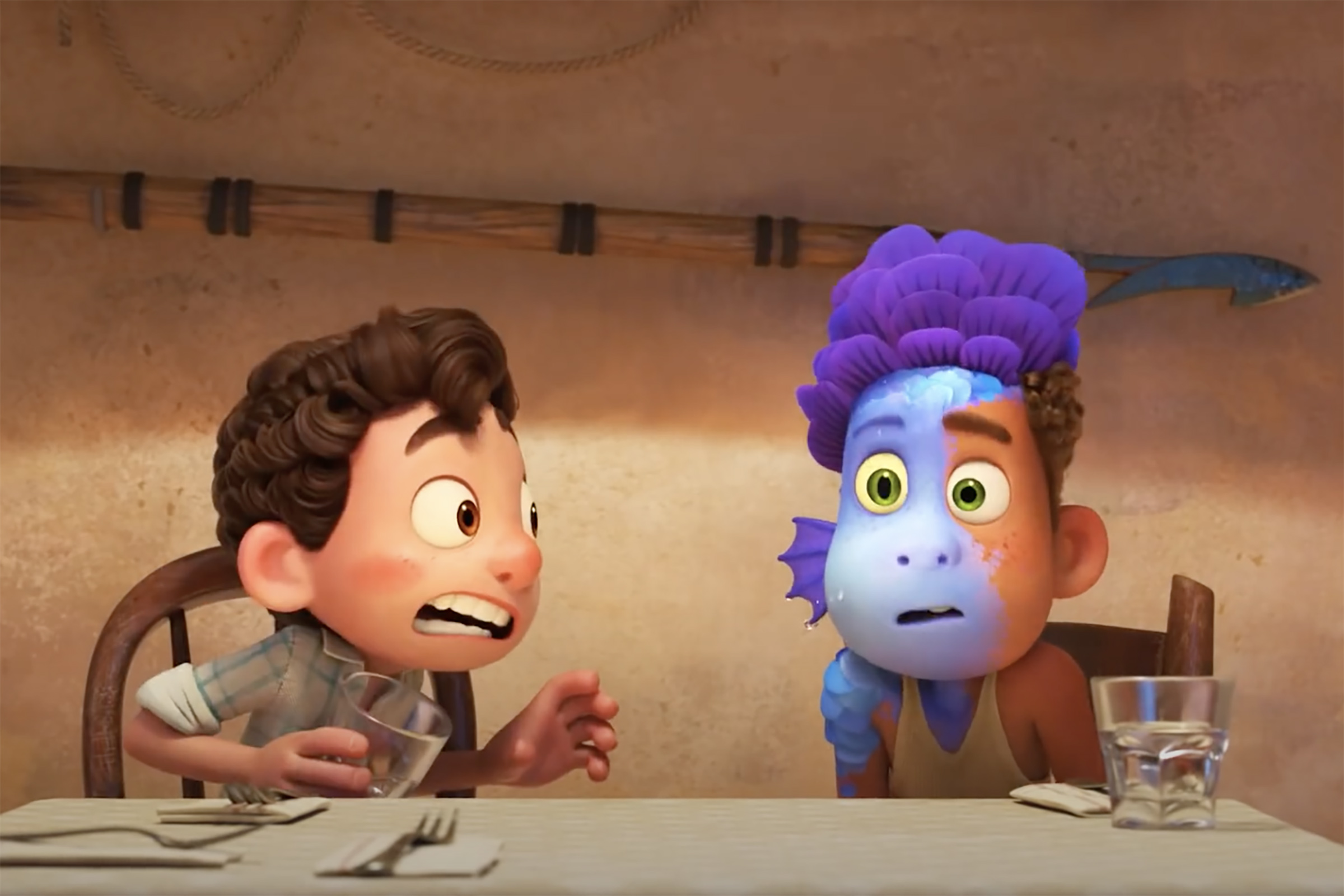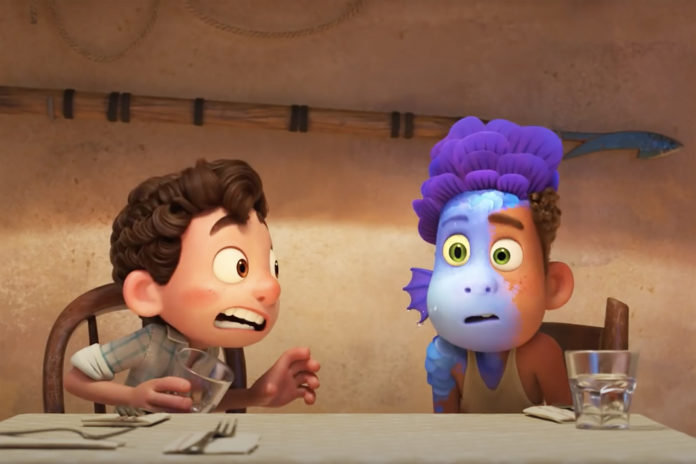
In May, my friend and I were taking a walk when she started excitedly telling me about Pixar’s newest film, “Luca,” which would be released in a few months. As she told me more about the trailers she’d seen, I was intrigued. Sea monsters that can become human when dry but change back to sea monsters when they get wet? Beautiful animated shots of the Italian Riviera? Young friendship with mild gay undertones? When the release date came, I was perfectly happy to pull open my laptop and enjoy a tight 95 minutes of friendship and fun. Luckily, Pixar’s 24th feature-length film was just as wonderful, if perhaps a bit different, than I’d expected.
The story focuses on Luca (Jacob Tremblay, “Room”), a young sea monster living with his family in an underwater community on the Italian Riviera. Luca’s life consists mostly of being a fish shepherd (fishherd?), trying to please his family and dreaming of the surface, while also being deadly scared of the land monsters — humans — who inhabit it. Enter Alberto (Jack Dylan Grazer, “It”), another young sea monster who shakes up Luca’s safe, albeit boring, world.
Luca and Alberto bond over a love of Vespa scooters and the desire to explore the world; soon, the two form a kind of opposites-attract friendship that naturally pairs Luca’s shy awe and Alberto’s blustering confidence. But soon, a series of events (including a visit from Luca’s anglerfish-esque uncle voiced by Sacha Baron Cohen [“Borat Subsequent Moviefilm”], because why not) leads the two boys to run away to live with the land monsters. There, they meet Giulia (Emma Berman, “Go! Go! Cory Carson”), a brash, unapologetic Italian girl whose father Massimo (Marco Barricelli, “The Book of Daniel”) boasts a successful fishing business and an impressive bushy mustache, the former making him more dangerous to the two, you know, fish people. Still, the three kids must form a team of underdogs in order to win a “traditional” Italian triathlon, which Giulia describes, deadpanned, as “swimming, cycling and eating pasta.” They want to win to … buy a Vespa? Defeat the obnoxious defending champ, Ercole (Saverio Raimondo, “Dov’è Mario?”)? Prove something to the world? Maybe a combination of all three.
Truthfully, it’s difficult to explain the plot of “Luca” — not because the plot is particularly complicated, but because it’s more of a long experience than a set plot. Moments and scenes are there to move along the relationships rather than moving a plot along. As a result, “Luca” is a different kind of Pixar film, free of some of the surprisingly abstract plots or brutally emotional gut punches that have set Pixar apart from other animated children’s movies in the past, but not in a bad way. This is not to say that there are no deeply emotional moments — the film’s climax is surprisingly intense — but “Luca” feels more like a film you can just sit back and enjoy, rather than being, as my mom would say, a “three-hanky movie.”
One of the best parts of “Luca” is, perhaps as expected, the animation. Everything from the Italian waterfront to the colorful transition between sea monster and human forms is incredibly vibrant and fun to watch (plus the sea monsters are frickin’ cute). My personal favorite scenes were the daydream sequences, used to depict Luca’s active imagination: gorgeous, sweeping animation that filled the screen with stunning images. The art design is particularly impressive given that much of “Luca” was, as is slyly stated in the end credits, “produced in our slippers around the Bay Area.”
The friendship between Luca and Alberto, however, is the real core of the film. Their personalities complement each other excellently, helped in part by the vocal performances: Tremblay’s vocal portrayal of Luca is filled with wonder and curiosity that is only heightened by the animated character’s overly large eyes, while Grazer excellently injects the unearned confidence of an adolescent boy into every false claim of expertise. There’s also something about the youth aspect of Luca and Alberto’s friendship that’s perfectly captured. One example that comes to mind: When Alberto shows Luca his crudely drawn picture of a Vespa, Luca tells him (earnestly, and unironically) that it’s the greatest drawing he’s ever seen, and Alberto replies with a confident “I know.” It’s hilarious, and feels incredibly accurate to how real kids talk.
As wonderful as their friendship is, it’s impossible to ignore the queer coding present throughout their interactions. Many critics (and all of Twitter) have made comparisons between Luca and the 2017 film “Call Me by Your Name” (including, but not limited to, this New York Times review entitled “Calamari by Your Name”), noting the similarities within the Italian setting and growing relationship between two boys. That said, it’s important to stress that while Elio and Oliver’s relationship is sexual, Luca and Alberto’s is decidedly not (they’re children, and it’s Disney). Personally, as someone who loves platonic love stories, I’m fine not putting any romantic spin on it, but people who watched the trailer and thought “Luca” was going to be an animated amalgamation of “Call Me By Your Name” and “The Shape of Water” might be disappointed. (Besides, if we’re going to make comparisons, we really should be talking more about “H2O: Just Add Water.”)
But it is worth thinking about the implications of this film and its potential as a gay narrative. Director and writer Enrico Casarosa (in his feature-length debut) has insisted that the story, based on his own experience meeting his childhood best friend, is purely based on platonic friendship. Taking the film at face value, that’s certainly true, but what many viewers see is the potential packed within Luca and Alberto’s relationship. Relationships between people sometimes change as children grow into themselves; the love between Luca and Alberto is a strong platonic love, but even if they are not explicitly gay, that does not mean they are straight. There are also layers within the film — prominent speeches about fear and acceptance, for example — that point to the possibility of the sea monsters being an allegory for queer identities, or for anyone who is perceived as different in society. Sure, revealing to someone you trust that you’re actually a sea creature isn’t quite the coming out you’d expect, but there are significant parallels.
It’s hard to paint “Luca” as Disney’s first unequivocally queer movie — which, given all of the fuss they made about LeFou in the live-action “Beauty and the Beast,” or the lesbian kiss in “Star Wars: Rise of Skywalker,” is a direction their marketing department could have gone. Still, while “Luca” doesn’t necessarily scream “Go-To Pride Month Favorite,” it could easily make its way into the LGBTQ+ community as a sort of “honorary” queer movie. Besides, having a film about two boys who care deeply about each other without a lot of the machismo that has been normalized in society is a rare gift in and of itself. With Luca and Alberto, the nature of the relationship matters less than the strength of it — and boy, is it strong.
So, as I’ve said, on its surface “Luca” fits just right into the Pixar filmography. There are established comedians voicing parents (in this case, Maya Rudolph [“Bridesmaids”] and Jim Gaffigan [“American Dreamer”] lend their talents) and up-and-coming actors voicing the kids. In the interest of creating a clear divide between the good and the bad, Ercole is a classic Disney villain with literally no redeeming qualities and no character development. They invite you into the world with a beautifully animated interpretation of the Italian coast and plenty of Italian jazz in the background. There’s some melodrama, but, like any Pixar film, there’s a lot of heart. Even with touches of emotion or melancholy, the film maintains a simple, pleasant tone. And while there is a complex discourse, it only makes the film richer for those viewing it. “Luca” may seem like a lighthearted story about childhood friendships, but it’s these layers that allow people to interpret and interact with it differently.
Daily Arts writer Kari Anderson can be reached at kariand@umich.edu.
Please consider donating to The Michigan Daily









